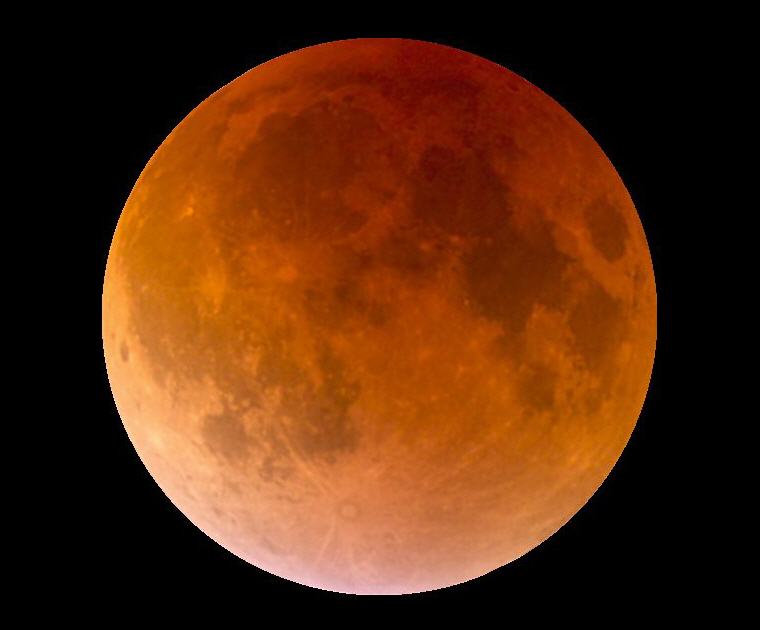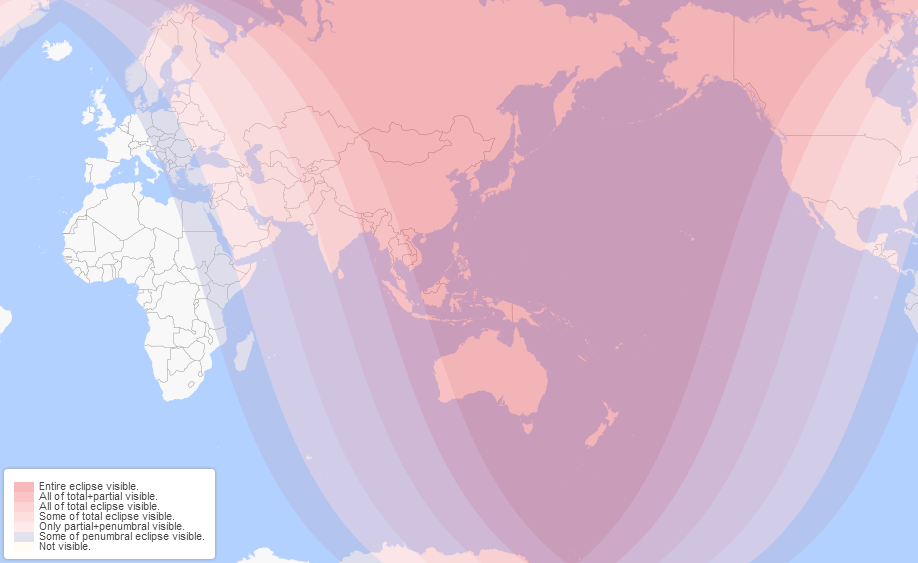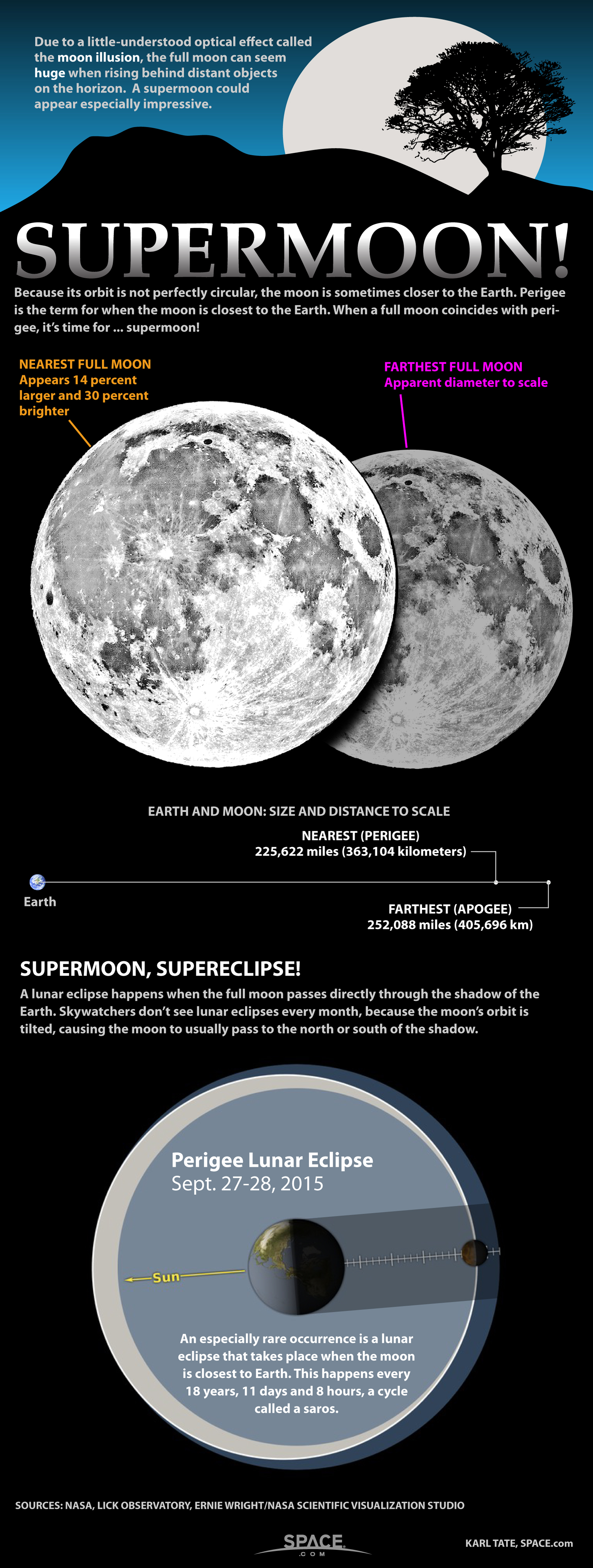First Blue Moon Total Lunar Eclipse on 31 January 2018, a rare occurrence that last happened over 150 years ago
January skywatchers are in for a rare treat: a Blue Moon, a Total Lunar Eclipse and a Super Moon all in the same month.
A Blue Moon (not exactly blue in colour) is when there are two full moons in the same calendar month and this happens about once every 2.7 years. Lunar eclipses occur when the moon passes into Earth’s shadow; and super moons happen when the moon comes closest to Earth and coincides with a full moon. In this case, the super moon also happens to be the day of the total lunar eclipse on 31 January. The last time when all the three events lined up this perfectly was more than 150 years ago on 31 March 1866.
Why does the moon appear orange or red during a Total Lunar Eclipse?
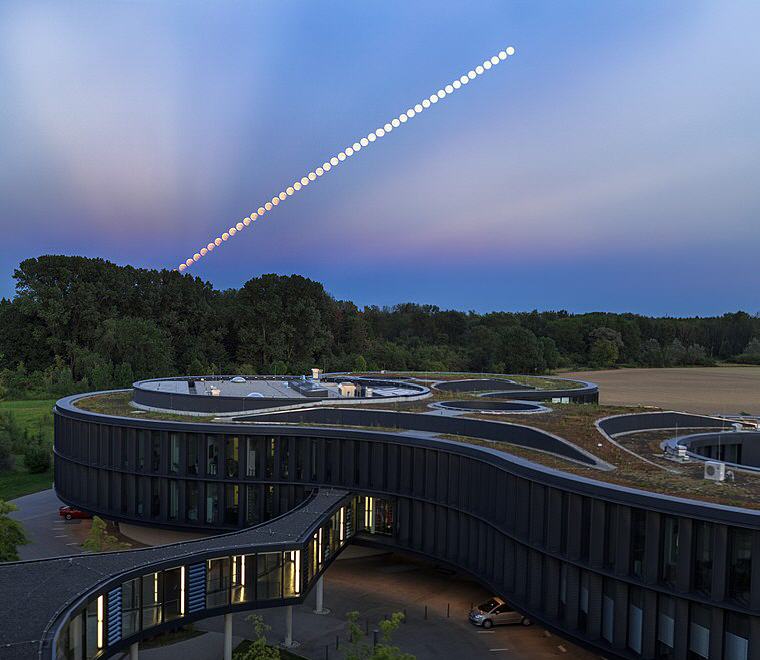
Time-lapse sequence of lunar eclipse, ESO headquarters, Garching bei München, Germany, 7 Aug 2017, Credit: ESO/P. Horálek, Wikipedia
According to Nasa, “During a total lunar eclipse, white sunlight hitting the atmosphere on the sides of the Earth gets absorbed and then radiated out (scattered). Blue-colored light is most affected. That is, the atmosphere filters out (scatters away) most of the blue-colored light. What’s left over is the orange- and red-colored light. This red-colored light passes through our atmosphere without getting absorbed and scattered, before the atmosphere bends it (refracts it) back out, projecting indirect, reddish light onto the Moon…How gold, orange, or red the Moon appears during a total lunar eclipse depends on how much dust, water, and other particles are in Earth’s atmosphere, as well as factors such as temperature and humidity.”
Eclipse Path Map
Best places to view: Central and eastern Asia, Indonesia, New Zealand and most of Australia
According to Space.com, “Central and eastern Asia, Indonesia, New Zealand and most of Australia will get a fine view of this moon show in the evening sky.”
Fortunately, for Singaporean, this total lunar eclipse is fully visible in Singapore. “The moon on 31 January can be viewed anywhere in Singapore, where there are no tall trees or buildings blocking your view, as long as you face the eastern sky,” according to Mok Li Hui, a Science Educator at the Science Centre Singapore. Hopefully, we will have clear sky on 31 January.
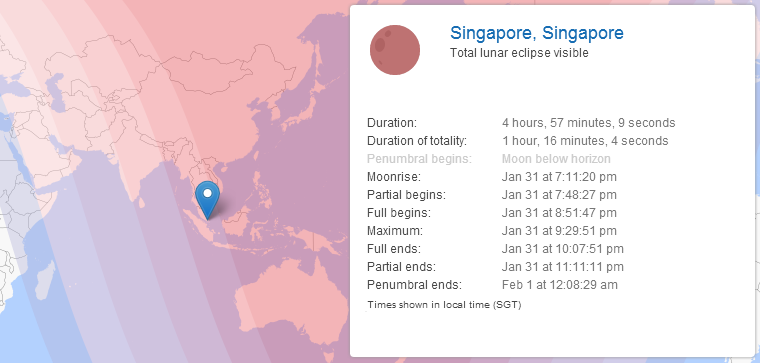
Total Lunar Eclipse Visible, Singapore, Credit: timeanddate.com
Date and Time of Lunar Eclipse in Singapore
Duration: 4 hours, 57 minutes, 9 seconds
Duration of totality: 1 hour, 16 minutes, 4 seconds
Penumbral begins: Moon below horizon
Moonrise: Jan 31 at 7:11:20 pm
Partial begins: Jan 31 at 7:48:27 pm
Full begins: Jan 31 at 8:51:47 pm
Maximum: Jan 31 at 9:29:51 pm
Full ends: Jan 31 at 10:07:51 pm
Partial ends: Jan 31 at 11:11:11 pm
Penumbral ends: Feb 1 at 12:08:29 amTimes shown in local time (SGT)
Planning a trip to Singapore? Search all flight deals
to Singapore
A Supermoon Trilogy: Super Blue Blood-Moon
Please note that you can see this Lunar Eclipse in the evening sky if you are in Central and eastern Asia, Indonesia, New Zealand and most of Australia
Thus, if you are already in any of the above places, you do not have to travel to any other places for this moon show. However, if you want to make this event extra special, below are 8 destinations which you can plan a trip to catch this Lunar Eclipse.
8 Destinations to catch this Total Lunar Eclipse, with date, and time of the eclipse
1. Bali, Indonesia
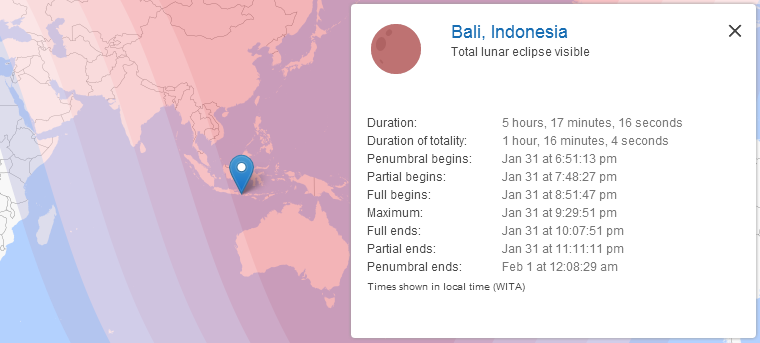
Total Eclipse Visible, Bali, Indonesia, Credit: timeanddate.com
Date and Time of Lunar Eclipse in Bali, Indonesia
Duration: 5 hours, 17 minutes, 16 seconds
Duration of totality: 1 hour, 16 minutes, 4 seconds
Penumbral begins: Jan 31 at 6:51:13 pm
Partial begins: Jan 31 at 7:48:27 pm
Full begins: Jan 31 at 8:51:47 pm
Maximum: Jan 31 at 9:29:51 pm
Full ends: Jan 31 at 10:07:51 pm
Partial ends: Jan 31 at 11:11:11 pm
Penumbral ends: Feb 1 at 12:08:29 amTimes shown in local time (WITA)
Search all flight deals
to Bali, Indonesia
Search for accommodations in Bali
2. Surabaya, Indonesia
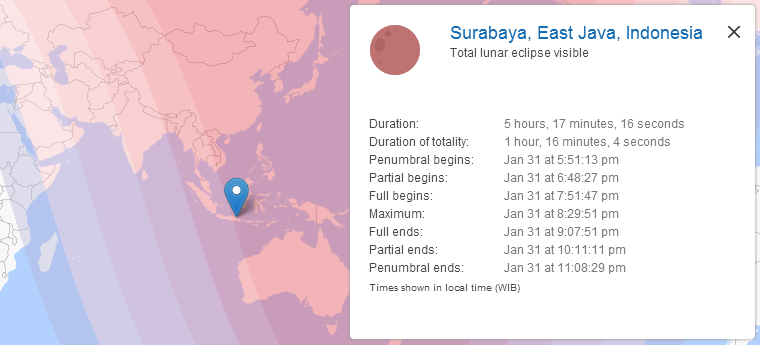
Total Lunar Eclipse Visible, Surabaya, Indonesia, Credit: timeanddate.com
Date and Time of Lunar Eclipse in Surabaya, Indonesia
Duration: 5 hours, 17 minutes, 16 seconds
Duration of totality: 1 hour, 16 minutes, 4 seconds
Penumbral begins: Jan 31 at 5:51:13 pm
Partial begins: Jan 31 at 6:48:27 pm
Full begins: Jan 31 at 7:51:47 pm
Maximum: Jan 31 at 8:29:51 pm
Full ends: Jan 31 at 9:07:51 pm
Partial ends: Jan 31 at 10:11:11 pm
Penumbral ends: Jan 31 at 11:08:29 pmTimes shown in local time (WIB)
Search all flight deals
to Surabaya, Indonesia
Search for accommodations in Surabaya
3. Boracay, Philippines
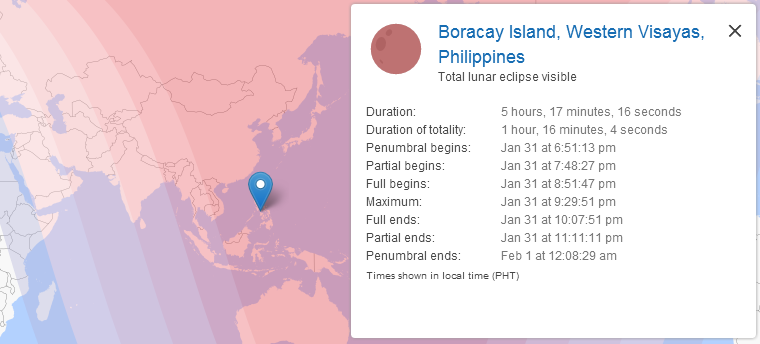
Lunar Eclipse Visible, Boracay, Philippines, Credit: timeanddate.com
Date and Time of Lunar Eclipse, Boracay, Philippines
Duration: 5 hours, 17 minutes, 16 seconds
Duration of totality: 1 hour, 16 minutes, 4 seconds
Penumbral begins: Jan 31 at 6:51:13 pm
Partial begins: Jan 31 at 7:48:27 pm
Full begins: Jan 31 at 8:51:47 pm
Maximum: Jan 31 at 9:29:51 pm
Full ends: Jan 31 at 10:07:51 pm
Partial ends: Jan 31 at 11:11:11 pm
Penumbral ends: Feb 1 at 12:08:29 amTimes shown in local time (PHT)
Search all flight deals
to Boracay, Philippines
Search for accommodations in Boracay
4. Da Nang, Vietnam
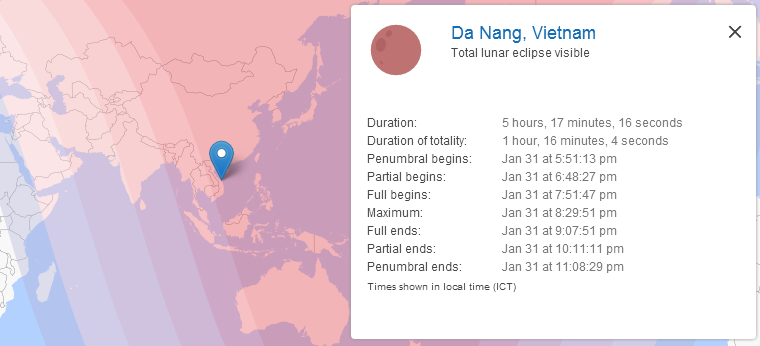
Total Lunar Eclipse Visible, Da Nang, Vietnam, Credit: timeanddate.com
Date and Time of Lunar Eclipse in Da Nang, Vietnam
Duration: 5 hours, 17 minutes, 16 seconds
Duration of totality: 1 hour, 16 minutes, 4 seconds
Penumbral begins: Jan 31 at 5:51:13 pm
Partial begins: Jan 31 at 6:48:27 pm
Full begins: Jan 31 at 7:51:47 pm
Maximum: Jan 31 at 8:29:51 pm
Full ends: Jan 31 at 9:07:51 pm
Partial ends: Jan 31 at 10:11:11 pm
Penumbral ends: Jan 31 at 11:08:29 pmTimes shown in local time (ICT)
Search all flight deals
to Da Nang, Vietnam
Search for accommodations in Da Nang
5. Tokyo, Japan

Lunar Eclipse Visible, Tokyo, Japan, Credit: timeanddate.com
Date and Time of Lunar Eclipse in Tokyo, Japan
Duration: 5 hours, 17 minutes, 16 seconds
Duration of totality: 1 hour, 16 minutes, 4 seconds
Penumbral begins: Jan 31 at 7:51:13 pm
Partial begins: Jan 31 at 8:48:27 pm
Full begins: Jan 31 at 9:51:47 pm
Maximum: Jan 31 at 10:29:51 pm
Full ends: Jan 31 at 11:07:51 pm
Partial ends: Feb 1 at 12:11:11 am
Penumbral ends: Feb 1 at 1:08:29 amTimes shown in local time (JST)
Search all flight deals
to Tokyo, Japan
Recommended reading: 10 must see in Tokyo
6. Okinawa, Japan
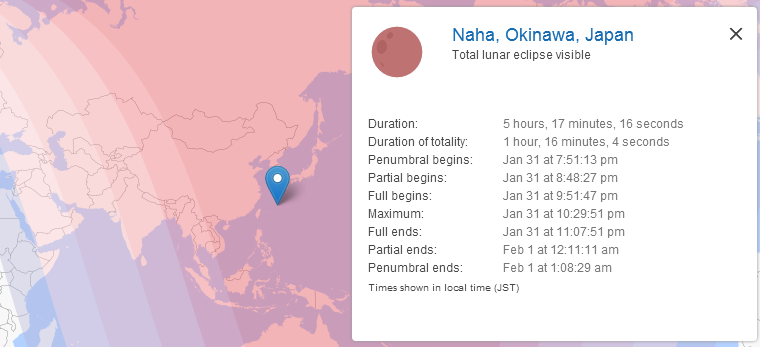
Total Lunar Eclipse Visible, Okinawa, Japan, Credit: timeanddate.com
Date and Time of Lunar Eclipse in Okinawa, Japan
Duration: 5 hours, 17 minutes, 16 seconds
Duration of totality: 1 hour, 16 minutes, 4 seconds
Penumbral begins: Jan 31 at 7:51:13 pm
Partial begins: Jan 31 at 8:48:27 pm
Full begins: Jan 31 at 9:51:47 pm
Maximum: Jan 31 at 10:29:51 pm
Full ends: Jan 31 at 11:07:51 pm
Partial ends: Feb 1 at 12:11:11 am
Penumbral ends: Feb 1 at 1:08:29 amTimes shown in local time (JST)
Search all flight deals
to Okinawa, Japan
Recommended reading: 12 Top things to do in Okinawa, Japan’s undiscovered gem
7. Christchruch, New Zealand
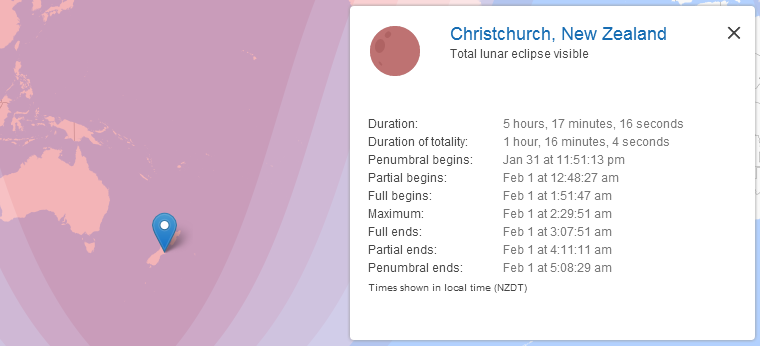
Lunar Eclipse Visible, Christchurch, New Zealand, Credit: timeanddate.com
Date and Time of Lunar Eclipse in Christchurch, New Zealand
Duration: 5 hours, 17 minutes, 16 seconds
Duration of totality: 1 hour, 16 minutes, 4 seconds
Penumbral begins: Jan 31 at 11:51:13 pm
Partial begins: Feb 1 at 12:48:27 am
Full begins: Feb 1 at 1:51:47 am
Maximum: Feb 1 at 2:29:51 am
Full ends: Feb 1 at 3:07:51 am
Partial ends: Feb 1 at 4:11:11 am
Penumbral ends: Feb 1 at 5:08:29 amTimes shown in local time (NZDT)
Search all flight deals
to Christchruch, New Zealand
Search for accommodations in Christchruch
8. Hawaii, USA
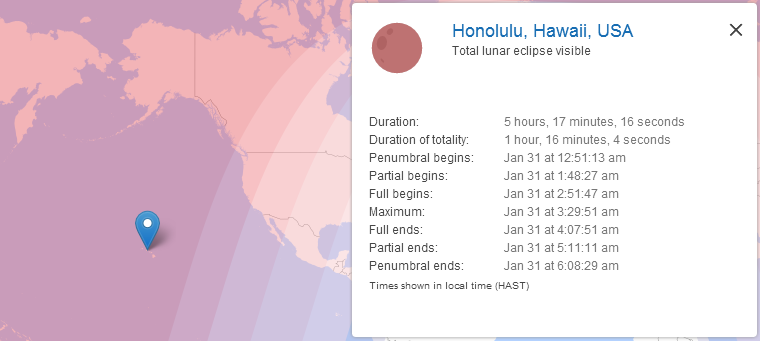
Lunar Eclipse Visible, Hawaii, USA, Credit: timeanddate.com
Date and Time of Lunar Eclipse in Hawaii, USA
Duration: 5 hours, 17 minutes, 16 seconds
Duration of totality: 1 hour, 16 minutes, 4 seconds
Penumbral begins: Jan 31 at 12:51:13 am
Partial begins: Jan 31 at 1:48:27 am
Full begins: Jan 31 at 2:51:47 am
Maximum: Jan 31 at 3:29:51 am
Full ends: Jan 31 at 4:07:51 am
Partial ends: Jan 31 at 5:11:11 am
Penumbral ends: Jan 31 at 6:08:29 amTimes shown in local time (HAST)
Search all flight deals
to Hawaii, USA
Search for accommodations in Hawaii
Next Total Lunar Eclipse: 27/28 July 2018
References: space.com. To check if your location can see the lunar eclipse, please check the Path Map at timeanddate.com
How the ‘Supermoon’ Looks (Infographic)
- Exploring Yangcheng Lake & Xianju of East China - September 13, 2024
- The Mysterious Xiangxi of China - July 22, 2024
- Stay For Good-New Travel with a Purpose Programme - May 18, 2023
